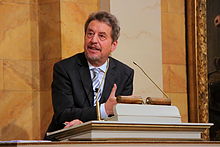German sociologist and social theorist
Hans Joas (; German: [ˈjoːas]; born November 27, 1948) is a German sociologist and social theorist.
Hans Joas is Ernst Troeltsch Professor[1] for the Sociology of Religion at the Humboldt University of Berlin. From 2011 until 2014 he was a Permanent Fellow at the Freiburg Institute for Advanced Studies (FRIAS); from 2002 until 2011 he was the Director of the Max Weber Centre for Advanced Cultural and Social Studies at the University of Erfurt. Since 2000 he has also been Visiting Professor of Sociology and Social Thought and a Member of the Committee on Social Thought at the University of Chicago. Hans Joas is Ordinary Member of the Berlin-Brandenburgische Akademie der Wissenschaften.
Life
- 1968–1971 studying sociology, philosophy, history, German literature at the University of Munich
- 1971–1972 studying the same disciplines at the Free University of Berlin
- 1972 "Diploma" in sociology
- 1973–1977 "Wissenschaftlicher Assistent" (Research and teaching fellow), Department of Sociology, Free University of Berlin
- 1979 Dr. phil. (Free University of Berlin)
- 1979–1983 Research Fellow, Max Planck Institute for Human Development and Education, Berlin (1980–1981 Visiting Professor, University of Tübingen)
- 1981 Habilitation
- 1984–1987 Heisenberg Fellow of the German Research Council (Deutsche Forschungsgemeinschaft)
- 1985 (Spring quarter) Visiting Professor, Department of Sociology, University of Chicago
- 1986 (Summer quarter) Visiting Professor, Department of Sociology, University of Toronto
- 1987–1990 Professor of Sociology, University of Erlangen‐Nuremberg
- 1990–2002 Professor of Sociology, Free University of Berlin
- 1993–1995 Executive Director, John F. Kennedy Institute for North American Studies, Berlin
- 1992 (Spring semester) Fellow, Swedish Collegium for Advanced Study in the Social Sciences and Visiting Professor, University of Uppsala
- 1994 (Fall semester) Fellow, Indiana University Institute for Advanced Study, Bloomington, Indiana
- 1996 (Fall semester) Visiting Professor, Department of Sociology, University of Wisconsin at Madison
- 1997 (Spring semester) Theodor Heuss Professor, Department of Sociology, New School for Social Research, New York
- 1998 (Spring semester) Visiting Professor, Department of Sociology, Duke University, Durham, North Carolina (Fall semester) Visiting Professor, Department of Sociology, University of Wisconsin at Madison
- 1999–2000 Fellow, Swedish Collegium for Advanced Study in the Social Sciences, Uppsala, Sweden
- since 2000 Professor, Department of Sociology, University of Chicago, Member of the Committee on Social Thought
- 2002–2011 Director, Max Weber Centre for Advanced Cultural and Social Studies, University of Erfurt, Germany
- 2002 (Fall semester) Visiting Professor, Department of Sociology, University of Vienna, Austria
- 2004–2005 Ernst Cassirer Professor, Swedish Collegium for Advanced Study in the Social Sciences, Uppsala, Sweden
- 2005–2006 Fellow, Wissenschaftskolleg zu Berlin
- 2007 (Spring semester) Visiting Professor, Department of Sociology and Faculty of Catholic Theology, University of Vienna, Austria
- 2010 (Spring semester) Fellow, Swedish Collegium for Advanced Study, Uppsala, Sweden
- 2011 (Spring semester) Fellow, Stellenbosch Institute for Advanced Study (STIAS), Stellenbosch, South Africa
- 2011–2014 Permanent Fellow, Freiburg Institute for Advanced Studies (FRIAS), University of Freiburg, Germany
- 2014 (Spring semester) Fellow, Torgny Segerstedt Professor, University of Gothenburg, Sweden
- since 2014 Ernst Troeltsch Professor for the Sociology of Religion, Faculty of Theology, Humboldt University of Berlin
- 2017 (Spring semester) Fellow, Stellenbosch Institute for Advanced Study (STIAS), Stellenbosch, South Africa
- 2017 (May) Fellow, Peking University, Institute of Humanities and Social Sciences
- 2022 (June) International Jakob Fugger Visiting Professorship, University of Augsburg
In 2012 Joas was the first scholar to be Visiting Professor of the Joseph Ratzinger Pope Benedikt XVI. Foundation at the University of Regensburg. The topic of his lectures was "Sacralization and Secularization".
Research
Hans Joas focuses on social philosophy and sociological theory, especially American pragmatism and historicism; sociology of religion and sociology of war and violence; and changing values in modern society.
A particular focus of Joas' research is the emergence of values. To this end, he elaborated a theory of the affirmative genealogy of values, especially of human rights. According to Joas, values emerge in experiences of self-formation and self-transcendence. To this end, he developed a phenomenology of the experience of self-transcendence "from individual prayer to collective ecstasy in archaic rituals or in nationalistic enthusiasm for war"; "it includes moral feelings, the opening of the self in conversation, and in the experience of nature." Joas emphasizes that his consideration of the contingency of the emergence of values should in no way be understood "as a plea against the claims of a universalistic morality."
In a three-volume work, Joas attempts to develop the outline of a global history of moral universalism from these premises. In the first volume, published in 2017, "The Power of the Sacred. An Alternative to the Narrative of Disenchantment," he presented a detailed critique of the historical narrative, going back to Max Weber, of a world-historical process of disenchantment that has been advancing since the Hebrew prophets, and a sketch of an alternative to it. In the second volume, published in 2020, "Im Bannkreis der Freiheit. Religionstheorie nach Hegel and Nietzsche", published in 2020 (English translation forthcoming), is concerned in parallel with overcoming the historical image of a history of religion culminating in Protestant Christianity and its constitutive significance for the constitution of modern political freedom, which goes back to Hegel. In portraits of important philosophical, sociological and theological thinkers on religion, the approaches to an alternative are further substantiated. In the third volume currently in progress (working title "Universalismus. Weltherrschaft und Menschheitsethos"), this alternative is being broadly elaborated historically and sociologically. His most recent book (2022), "Warum Kirche? Selbstoptimierung oder Glaubensgemeinschaft" relates the debates about a new understanding of church and about church reform to this history of moral universalism.
